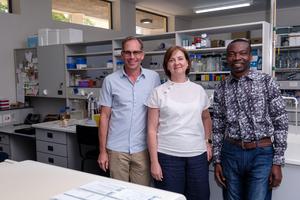A network of world-class scientists across Africa has entered the global drug discovery arena following a US$7.2 million joint investment by the medical research charity LifeArc and the Bill & Melinda Gates Foundation in the Grand Challenges Africa Drug Discovery Accelerator (GC ADDA) programme.
Grand Challenges is a family of initiatives fostering innovation to solve key global health and development problems.
GC ADDA will leverage US$4.7 million (about R85 million) of the funding to develop new drugs in the fight against malaria and Tuberculosis (TB) – two of the top killers that disproportionally affect Africans – by supporting two teams led by scientists from the Universities of Ghana (UG) and Pretoria (UP) and Stellenbosch University (SU).
While African countries have made remarkable progress in the fight against malaria and TB, the continent still bears the brunt of infectious diseases burden, with these two age-old diseases killing almost one million people on the continent each year. According to the World Health Organisation, of these, about 600 000 deaths are due to malaria and 400 000 due to Tuberculosis. The continued development of treatment-resistant forms of these diseases means that there is a critical need for innovative tools to eliminate them.
GC ADDA has two main objectives: to support exciting drug discovery projects in Africa and create a project-driven virtual African drug discovery network that advances Global Health. GC ADDA brings together and leverages on partnerships that support strategic and scientific leadership.
Leading research efforts on malaria and TB in Africa
Leading the drive to deliver novel malaria drug candidates are Dr Richard Amewu, head of the Drug Innovations Group at the University of Ghana, and Prof. Lyn-Marié Birkholtz from the University of Pretoria Institute for Sustainable Malaria Control (UP ISMC) in South Africa.

Prof. Birkholtz says the need for antimalarial drugs in Africa is critical since malaria cases are increasing. “We have to propel existing discoveries forward by building on our existing capacity and expertise.”
According to Dr Amewu, this funding will support ongoing efforts by African scientist in contributing to the global efforts to address this problem,” he says. These efforts will expand the capabilities on the content and build on the leading contributions in drug discovery that stemmed from the Holistic Drug Discovery and Development Centre (H3D) based at the University of Cape Town in South Africa.
The network of scientists working on malaria also includes Prof. Fabrice Boyom at the University of Yaoundé in Cameroon; Prof. Amanda Rousseau at the University of the Witwatersrand; Dr Winston Nxumalo from the University of Limpopo; Prof. Laurent Dembele and Dr Dinkorma Ouloguem from the Université des Sciences, des Techniques et des Technologies de Bamako in Mali. They will interact closely with experts from the University of Dundee’s Drug Discovery Unit in Scotland, the biotech company Lgenia (USA), the Malaria Drug Accelerator, and the Medicines for Malaria Venture (MMV) as well as the H3D.
In reaction to the announcement, Dr James Duffy, senior director of drug discovery at MMV, said it is going to be a game changer for African scientists and drug development on the continent: “A unique environment and opportunity has been created where world-class scientists from disease endemic countries can collaborate to discover new drugs to address unmet patient needs on their doorstep.”
In the fight against multi-drug resistant TB, the effort will be led by Prof. Erick Strauss from the Department of Biochemistry at Stellenbosch University (SU), in partnership with Dr Gabriel Mashabela at the South African Medical Research Centre for TB Research, (also at SU), and teams led by Prof. Adrienne Edkins at Rhodes University and by Prof. Rajshekar Kapoormath at the University of KwaZulu-Natal in South Africa, as well as Dr Elizabeth Kigondu and Dr Edwin Murungi at the Kenya Medical Research Institute.
According to Prof. Strauss, the aim is to pursue new, previously unexplored avenues for discovering effective treatments against TB. These efforts will complement the many existing drug development efforts led by other international consortia, such as the Tuberculosis Drug Discovery Accelerator (TBDA).
Dr Clif Barry, chief of the Tuberculosis Research Section at the National Institutes of Health in the United States, says TB and especially multidrug-resistant TB, continue to be a significant health burden in African countries: “It is only fitting that an investment of this scale should be made to support scientists on the continent who are working to develop new antituberculosis treatments.”
Both the malaria and TB projects will be supported by the Pan Africa DMPK (Drug Metabolism and Pharmacokinetics) Centre of Excellence led by Professor Collen Masimirembwa, African Institute of Biomedical Science and Technology (AiBST) in Zimbabwe, and a funded member of the GC ADDA. The remainder of the funding will go to Dr Fidele Ntie-Kang from the University of Buea in Cameroon. He will be creating a set of 400 natural products found in Africa for screening against a range of diseases, including TB and malaria.
H3D director Prof. Kelly Chibale said the grant is a major leap forward towards building a critical mass of scientists fighting these diseases on the African continent. H3D plays a leading role along with H3D Foundation and Science for Africa Foundation in the Grand Challenges Africa (GC Africa) initiative.
Prof. Sibusiso Moyo, Deputy Vice-Chancellor: Research, Innovation, and Postgraduate Studies at SU, said the three universities have a long history of collaboration through the African Research University Alliance (ARUA) together with other African partners: “I want to congratulate the lead scientists for successfully securing the grant and demonstrating the role that universities can play in innovation and accelerating drug discovery.”
Background for editors
What is Malaria?
Malaria is a disease caused by parasites (Plasmodium) that can infect people after being bitten by an Anopheles mosquito that carries these parasites. Symptoms occur about two weeks after a person is bitten. In Africa, however, people can get bitten tens of times a night, thereby significantly increasing the risk of malaria disease. Moreover, the most lethal form of the parasite (Plasmodium falciparum) occurs in Africa. If treatment is left too late, it can cause death within 24 hours. Unfortunately, both the parasite and the mosquito have adapted to current control tools by developing resistance and the mosquito even changing its behavior. This makes control of the disease very difficult. New antimalarials must be developed continuously to prevent the disease, save lives, and stop the spread of the parasite.
What is Tuberculosis?
Tuberculosis (TB) is caused by a bacterium (Mycobacterium tuberculosis) that is typically spread by the cough of infected individuals, releasing droplets containing the bacteria in the air. Once infected, the bacterium can remain dormant in carriers for years, causing no active disease symptoms. However, prior infection with HIV predisposes individuals to the disease to progress to lung-based TB. In such populations, the prevalence is nearly double that in those living without HIV. South Africa currently has one of the highest prevalence rates of TB infection, with almost 1 in every 100 of the population infected. While TB is treatable with a course of antibiotics, the standard course of treatment lasts for six months. The high disease burden, coupled with the difficulty many people face in completing treatment, has led to the development of new forms of TB that are resistant to nearly all forms of currently available treatments.

